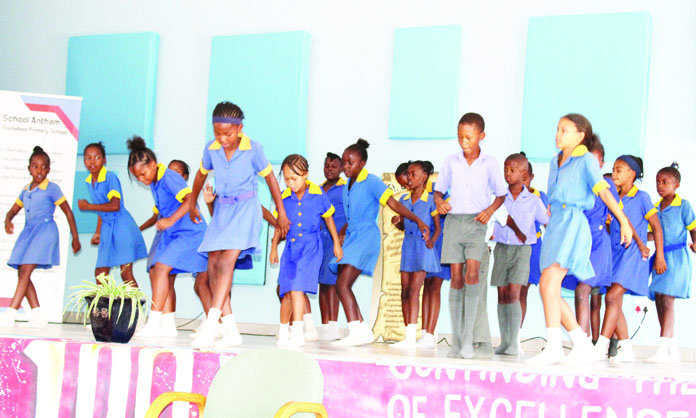Katutura-based St Barnabas Primary School marked 100 years of existence amid much pomp and fanfare yesterday.
Founded in 1923, the school has produced prominent figures including political leaders like founding president Sam Nujoma, former diplomat Kaire Mbuende and member of parliament Gothardt Kasuto, among others.
In a speech read on her behalf by her deputy Jenelly Matundu, international relations minister Netumbo Nandi-Ndaitwah said, “A hundred years ago, very few thought that this school would survive under such oppressive conditions, but it has stood the test of time.”
Nandi-Ndaitwah said the school has played a huge role in preparing men and women for their roles when freedom still looked distant and unattainable to many.
“These visionary efforts have bred brave leadership, brought greater awareness of our civil rights, added value to the liberation movement and have understood the impact of education as a pool of liberation,” she said.
St Barnabas Primary School has been a steadfast presence in Windhoek’s educational landscape. What began as a humble, one-room schoolhouse has evolved into a renowned institution that has consistently upheld its commitment to academic excellence and character development.
The school’s centennial celebration was a grand affair, attended by current and former students, teachers, political leaders and the wider community.
“The government has done what it could within the limitations of resources at its disposal to enhance education. I am proud to say that I notice the endeavours of the principal to continue on this path of postmodern methods to foster unity and a common purpose to lead the school to the next level of excellence,” said Nandi-Ndaitwah.
Mbuende noted that the school was established by the Anglican church and was initially dominated by South African teachers before Namibian teachers took over.
“Because of its background, it had a programme which meant that the teaching of English was a priority and also because it was a multi-ethnic group. That was important because all the ethnic groups attended the school and did things together like playing soccer, and that cemented the unity within our community,” he said.
According to Mbuende, the teachers had very high ambitions and high expectations from pupils.
“At first, the learners thought it was impossible for a black child, but I am proud to say that a number of former learners have achieved their dreams,” he said.
Mbuende, who attended the school from Grade 1 to Grade 8, noted that the school had prepared Nujoma before he left for exile, therefore, it also plays a significant role in the history of Namibia.
Mbuende encouraged parents to take their children to government schools and help develop state schools in Namibia.
St Barnabas Primary School’s rich history is a testament to its resilience and adaptability. Over the years, it has weathered challenges and embraced change to stay relevant in the ever-evolving field of education.
The school’s leadership is keen on nurturing the potential of every pupil, ensuring they are well-prepared to face the future.
To commemorate this milestone, the school also unveiled a centenary monument, signifying a beacon of knowledge and values for generations to come.
The celebration concluded with a grand gala, where students showcased their talents in music, drama and dance.
The event was a reminder that St Barnabas Primary School’s legacy isn’t just built on books and lessons, but also on the creative and artistic expressions of its pupils.
In the words of one parent attending the celebration, “St Barnabas has been a pillar of this community for a hundred years, and we look forward to the next hundred, as the school continues to nurture, inspire, and educate the leaders of tomorrow”.



Leave a Reply